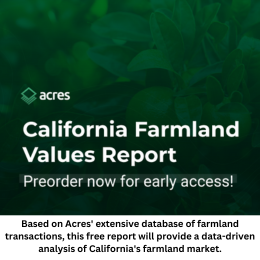February 20, 2024
By Lynda Kiernan-Stone, Global AgInvesting Media
Gresham House has launched the Gresham House Biodiversity Co-Invest LP (GHBC), a new sector specialist strategy to accelerate the deployment of nature-based solutions to mitigate biodiversity loss while gaining strong financial returns.
Anchoring the strategy, which has a funding goal of $380 million, is Willis Towers Watson (WTW), a top global insurance and advisory company with more than $150 billion in AUM and $4.7 trillion of assets under advisement.
This strategy will invest in “Habitat Banks” created by Environment Bank Limited (EBL), a portfolio business of Gresham House’s British Sustainable Infrastructure Fund (BSIF) Strategy. These “Habitat Banks” turn landscape-scale areas of non-arable farmland into rich combinations of woodlands, wetlands, and grasslands in accordance with the British government’s BNG metrics. BNG (biodiversity net gain) units are then generated from these assets and sold to developers requiring planning permission, thereby generating financial returns by driving positive environmental and social impacts.
As the UK government’s Environment Act of 2021 goes into effect, BNGs of at least 10 percent are required, meaning habitats must show a measurable improvement compared to prior to development for projects to gain planning permission.
These rules make England, which is in the bottom 10 percent globally for biodiversity metrics, one of the first countries in the world to require mandatory BNGs, creating a new market worth hundreds of thousands of pounds, and setting the pace for other countries to follow suit, stated Gresham House and WTW.
With the backing of this strategy, EBL will be enabled to offer the nation’s developers a fully-funded, one-stop solution to the hurdles associated with the BNG requirements, providing both legal and financial certainty and stability.
In addition, they also give corporates a clear opportunity to demonstrate their vision for the long-term value of investing to become “Nature Positive”, explained Gresham House and WTW, and for becoming early adopters in their Taskforce for Nature-Based Financial Disclosures (TNFD) – complementing the Environment Act’s BMG requirements.
Further, following the final close of Gresham House’s BSIF II at $570 million in November 2023, the firm’s Sustainable Infrastructure team is currently planning the launch of BSIF III with a funding target of $950 million to deliver real-asset-based solutions at even greater scale and pace. Now, EBL is prepared with on-the-ground solutions for developers and nature-positive corporates to address diversity loss and ecosystem fracturing across the UK.
“With nature consistently emerging as a key theme in the global narrative around climate, it shows consensus is rapidly growing among political and business leaders that we cannot combat the climate crisis without addressing biodiversity loss,” said Peter Bachman, managing director of sustainable infrastructure, Gresham House.
“We are extremely proud of having co-created a nature-based solution with EBL tailored to the needs of the UK Government and industry alike. With the UK in the bottom 10 percent globally in terms of biodiversity, we can see no better place to partner with forward-thinking investors such as WTW to tackle this grave threat.”
As the only such national-scale operator, EBL already has a network of Habitat Banks across England, and this newly launched GHBC Strategy will provide the needed support for them to continue to scale to meet rising demand as they are poised to be key in filling the supply-side gap in nascent voluntary compliance markets.
At the scale already developed, EBL’s Habitat Banks are creating a biodiversity multiplier effect, and EBL’s fully-funded model gives double assurance: of best-in-class ecology, and legal and financial certainty for all stakeholders. And with Gresham House’s new strategy, it is this network that EBL aims to scale to 8,000 hectares of Habitat Banks with the potential to increase species diversity 20 times by 2026.
“To create positive outcomes for both nature and society, we need to deliver the right landscapes in the right areas,” said Ruth Murray, investment director, Sustainable Infrastructure. This lies at the heart of EBL’s work, from their work with developers and local authorities, right through to neighboring communities.
“The rapid mobilization of capital from WTW into the nascent biodiversity market speaks volumes about the quality of the ecology and proposition that we’ve co-created with them. Their backing speaks to a strong desire for climate leadership within the insurance and advisory sectors.”
Murray continued, “We are thrilled to be able to bring this truly game-changing solution to market, and to see the growing recognition globally around the critical need to fund nature restoration at scale. We look forward to helping other investors deliver robust financial returns through driving positive impact for nature.”
~ Lynda Kiernan-Stone is editor in chief with GAI Media, and is managing editor and daily contributor for Global AgInvesting’s AgInvesting Weekly News and Agtech Intel News, as well as HighQuest Group’s Unconventional Ag. She can be reached at lkiernan-stone@globalaginvesting.com.
*The content put forth by Global AgInvesting News and its parent company HighQuest Partners is intended to be used and must be used for informational purposes only. All information or other material herein is not to be construed as legal, tax, investment, financial, or other advice. Global AgInvesting and HighQuest Partners are not a fiduciary in any manner, and the reader assumes the sole responsibility of evaluating the merits and risks associated with the use of any information or other content on this site.

Let GAI News inform your engagement in the agriculture sector.
GAI News provides crucial and timely news and insight to help you stay ahead of critical agricultural trends through free delivery of two weekly newsletters, Ag Investing Weekly and AgTech Intel.




